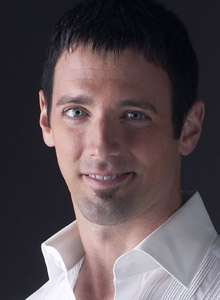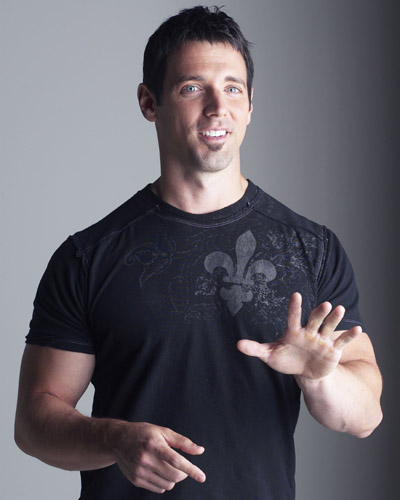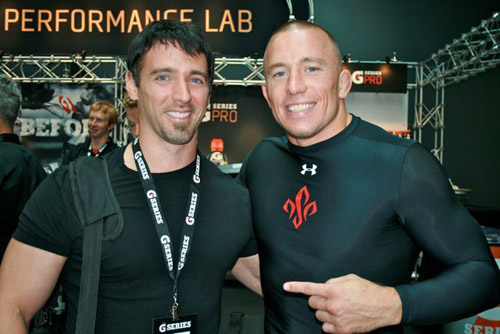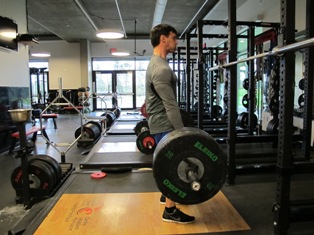- Hear Some Advanced Nutrition Tips For Staying In Shape From The Nutritionists Coach – John Berardi
- Learn About Nutrition From A Source Of Tim Ferriss For His Book 4 Hour Body
- Meet The Nutrition Coach For Many National Sports Teams – John Berardi
Full Interview Audio

Personal Info
Sports Teams: Mixed Martial Arts and the UFC
Favourite Books:
- The Fountainhead by Ayn Rand
- The Grapes of Wrath by John Steinbeck
- Motivational Interviewing, Second Edition: Preparing People for Change by William R. Miller Phd, Stephen Rollnick PhD
Favourite Entrepreneurs: Jason Fried, David Hansson, Eben Pagan
Company Website: http://precisionnutrition.com
Interview Highlights
This is a condensed, lightly edited transcript of an audio interview. The full audio is available and highly recommended. The interviewee may post clarifications in the comments.
Adrian Bye: Today I am here with John Berardi who runs Precision Nutrition and this guide is focused around nutrition and how to get your nutrition really dialled in, which I think a lot of people are starting to realise, if you want to get in shape, nutrition is going to be a very, very, very big component of that. They also do a lot of coaching and stuff with the body building industry as well as other professional athletes and focus on both on getting in shape as well as maintaining a lot of physique. So, John, thank you for joining us.
John Berardi: Thanks for having me; I really, really appreciate you inviting me on. I know you typically interviewing successful internet business people, marketers and CEOs and so it is cool to make an appearance and represent the fitness and nutrition industry today.
Adrian Bye: Can you tell us a little bit about your story? Who you are and where you come from?
John Berardi: As you said, I currently I run the nutrition research and coaching company Precision Nutrition. Our website is one of the most popular in this area and we have about 200,000 newsletter subscribers and about 500,000 unique visitors coming to our site each month. And you know, in terms of what qualifies us to do this, or me specifically; my training originally, I have an undergrad degree in pre-med and I went on and did masters training in exercise physiology and a earned PhD in exercise and nutrition biochemistry. That’s my background, but my team members are equally well trained, and sometimes better trained than me. We have MDs on our team and other PhDs in different areas, from psychology to physiology.
So you know that is a bit of our academic stuff. Then in terms of what we do; although we get a lot of attention for working with elite athletes, so we have contracts in the NBA, the NHL and NFL and we work with a lot of individual athletes. Still there are few athletes in the world, relatively speaking. 95% of what we do is work with recreational exercisers, who want to finally get a handle on this area of their lives, this fitness and body confidence thing. They want to look good, they want to feel good and they want to perform good. Even if it is not in sports, just waking up and having a successful day. So that is where we kind of spend a lot of our time helping those people get a handle on that. Which is actually becoming more of a challenge for our society; it seems like almost every day.
Adrian Bye: There is a lot of places out there to learn about nutrition; so what is different about you guys?
John Berardi: So what we do differently is, although we do have information presentation in book format, and stuff like that, we have an entire community that backs that up. So when you say, well alright I’ve read this information, how do I apply it? How can I determine what my other limiting factors might be? Whether they’re my structure, whether it’s my relationship with food and I know that sounds like a really ambiguous kind of thing but we all have some kind of relationship to food and to exercise, what we believe about food, what we believe about exercise, what we believe about ourselves. And those things can be bigger limiting factors that just knowing how many carbs to eat.
So what we do differently is we really dig into both sides. The physiology and the psychology and we provide a really expansive support community, where people can come on and ask questions of me and my other team mates. And I know Adrian, you have participated in this community, that one of the more valuable things, I think, although at first people say, well great I get to ask John questions. But one of the awesome and more valuable parts is actually interacting with other people going through the process. And I know Adrian you do that pretty extensively and I know that is another huge value for people. So when they come and interact with precision nutrition, they get this experience; we call it social support sometimes. And I think that makes a huge, huge difference.
Improving your nutrition or your exercise habits, really it’s not one project to take on, or it is not one habit to change. People think that is the case, so they say I want to get my nutrition handled, Dr Berardi, will you give me a diet to follow? And my answer is typically, no, no I won’t. And that turns a lot of people off at first, until I give them the explanation as to why. And still even after they understand why, they don’t want to believe me. In the nutrition industry, that is par for the course. It’s. I’m going to hand you this diet, I want you to post in on your fridge and I want you to follow it relentlessly, for the next however long, until you are in shape. And that sounds nice and it sounds easy and it sounds maybe like something we should be doing. But the problem is, like you said, to actually go from where you are today to being able to follow that diet relentlessly every day when life is throwing all kinds of curve balls at you, is probably, if not hundreds, but thousands of small changes every single day that has to take place. So instead of staying, hey, Adrian, can you follow this diet from now on? I say can you do 500 changes to your food and exercise habits, starting tomorrow forever?
And so another huge component of what we teach is this one habit at a time approach. One of my favourite books that sort of outlines one guys journey on this is, the power of less. And the idea is that we try to take on new projects in life and maybe it is getting a handle on body fat, or maybe it is learning to play the guitar, something like that. We want to take on as much as possible and we want to just crush it. And what usually happens is that we do spend a little bit, maybe a few weeks, maybe it is the first month, maybe we are supremely disciplined and we spend the first two months completely crushing it. The problem is that the rest of our lives start to knock on the door and say I would like back in. And maybe you have a family, maybe you have a business or some other hobbies and when those things start calling for some attention, you really get conflicted. Because you are like, man I am really working hard on this nutrition thing, but I am neglecting the rest of my life. And that is when most people usually bail, it’s where they usually give up. And that is when the failure rate on dieting is so terrible, because it requires such an all-encompassing effort that it actually squeezes out important things from your life.
So we take a completely different approach. We make it as easy as possible and we actually try and break the habits down into sort of single serving habits and then we build them up over time. You have heard about our coaching programme and in our coaching programme, that’s exactly what we do. People work with us for about a year in duration and every two to four weeks they get a new habit to follow. And whenever they get a new habit, there is like a new universal cry, wait a second this is too easy, I can do this, give me more! The problem is when you get more; you get these problems that I talked about earlier. When you keep it as easy as possible, that’s exactly what we are going for. When I give someone a new habit and they say, of course I can do this, this is super easy, and that is when I know we have hit on the right approach.
Adrian Bye: You have this diet called the get shredded diet, I wondered if you could tell us a little about how you came up with it and where it came from?
John Berardi: The get shredded diet is really an artefact of what the top physique manipulation specialists in the world, which are body builders, have done for a very long time. When people who are recreational exercisers think of body builders, they think, gee that’s not me; I don’t want that to be me. But really the one thing we can take away from body builders is that for dozens of years, since there has been physique competitions of this style, you have these people who typically, in about 10 to 12 weeks – so under three months, can take their body fat from what is kind of normal, so 12-15% is our reference college aged male body fat percentage, to totally ripped. Almost no body fat left except for the essential body fat around their organs. That is kind of cool and we have to think, what can you learn from that as a recreational exerciser, just the average guy who wants to look better? 
So with the get shredded diet, I really just looked at what body builders have been doing for a very long time when they get ready for their competitions. Which is cut carbs, increase protein, exercise in a certain way, use their macro nutrients effectively so that they can be in a calorie deficit, so they are eating less than they are burning and still get all the nutrition that they need, and that is a really difficult part. And that is the problem with a lot of fad diets nowadays.
Fad diets generally find ways to trick you to eat less and that is really the fundamental consistent pattern with all fad diets, or any successful diets to be quite honest. The problem with a lot of the fad diets is that they don’t take into account that you need nutrients. So what we tried to do with the get shredded diet is simply put someone in a calorie deficit, control their carbs and their insulin – which is a hormone that helps us to get lean and still provide enough nutrient dense food. So food that provides all those vitamins and minerals so you can go through this process of getting super lean without having a nutritional deficiency or having a hormonal crash. So that is the difference between what we are doing with get shredded and a lot of the fad diets out there, if you will.
Adrian Bye: How did you feel when you were at 4% body fat? I have talked with people about that and they say that is insane, it has got to be really bad for you.
John Berardi: Well, the truth is, whenever doing a bodybuilding approach to getting as lean as possible, you don’t expect to maintain 4% body fat. It is very difficult to maintain it because you are in a negative energy balance. And when you get to, either a certain body weight – and scientists aren’t quite sure yet whether it is a body weight threshold or a body fat threshold – or just a negative energy balance that is too big.
So, let’s say you are burning 2000 calories a day, but you are only eating a 1,000. So your negative energy balance is 1,000 calories. So you are 1,000 calories under what you are actually burning. So we are not sure if it is that number, that deficit, if it is your body fat or body weight that causes you to feel bad. But when you get to some certain threshold of leanness or calorie deficit, you start feeling really bad. There is a whole bunch of great physiology that describes it. And what is essentially happening is your body is calling for you to get back to some healthy set point. So it wants to be heavier, it wants to have more body fat; it wants to have a bit more energy each day. So it sends hunger signals, it sends hormonal changes, it slows your metabolism.
So that is a danger with getting that lean sometimes is that a bunch of physical body systems will start to slow down to try and preserve your body weight. Because fundamentally your body thinks, oh man if we keep going in this direction we are going to be dead soon!
The other thing, this is really relevant to continued weight loss. When you get down to that level of body fat percentage, what typically happens is your non-exercise activities start to really suffer. You start to want to do less physical activity. If you are on a training plan where you go to the gym 3 or 5 days a week, you will be able to get to the gym, you will be able to give it a good effort, no problem. So when people are in that type of situation where they are getting super lean in a calorie deficit and working out 3 to 5 days a week, they feel like, hey I am still doing the same amount of activity; but usually they are not. If we actually were to track the number of steps they are taking a day or the amount of calories they burn outside of the gym. It is starts to plummet quite dramatically. And the interesting part is most of the calories that we burn a week, aren’t burnt at the gym; they are burned through living, daily living activities. So a great example of this is as you tend to get leaner, as the day progresses, you find yourself sitting and laying on the couch a heck of a lot more. And it is simply because your body is slowing down its desire to move, because you are losing weight either too rapidly or you are getting at the lower bottom threshold. 
Adrian Bye: I want to talk a little bit about supplements.
John Berardi: When it comes to supplements, I think with our site, there is a fine line we walk. Because, I think probably for the recreational exerciser who is just using some best practice supplements as nutrition, there is very few supplements you actually need. Most of it we can get from food, but we probably aren’t eating enough food to get it, in some cases, and if we did eat enough food to get it we would be overweight. So it is kind of like a surrogate for calories in some cases when we are eating essential nutrients.
There are some great supplement tricks to enhance our metabolic performance, our mental performance etc. I think the problem comes in with supplement marketing, to be quite honest, because the way that supplement marketing goes is: if someone wants to release a new product, they come up with a laundry list of benefits that almost anyone in the world who is in their right mind would want at least one of those benefits. And then it’s basically, this product does everything you could want to have done to you, so take it. Then the next product that comes out says the same thing! So it is very hard to decipher what these things are actually supposed to doing to us and whether they will or not.
Adrian Bye: Tim Ferriss’s book: the four hour body, what were you doing with Tim?
John Berardi: Tim and I have just sort of crossed paths a few times. Tim is well known for his four hour work week stuff and his lifestyle hacking stuff. For people who don’t know this, he is a real avid physique manipulation, body comp performance hobbyist as well. Obviously he has made his a professional foray in his new book. So over the years myself and some of the other experts who have featured in the book, we have crossed paths with Tim and actually one of our team members, who works with Precision Nutrition actually helped with some of the writing of that project as well. Tim used me and some of the team as resource in the creation of the book, and we are actually working on a couple of other projects together now. Again a hobby and passion for Tim into physical development and getting in shape so our paths kind of cross that way.
So, I really feel like we are trained when we start to looking at new areas, so let’s say its fitness and nutrition, to look for differences. I think we are trained by the media and I think there is this inclination to be a critic in all of us. And so we start looking: ok the Atkins diet or Ornish plan, the Zone, Precision Nutrition where are they different? And when we start doing that, we actually shut off the part of our brain that allows us to figure out the similarities. And it is the similarities where all the good stuff resides.
Like I said, Precision Nutrition, the get shredded diet, the Atkins diet and any fad diet that you find, whatever ridiculous name they attach to it, they all, the similarities between them all, is that they find a way to get you to eat less. Get into a negative energy balance and that is why most of them can work.
The rest of the equation though is can you be healthy at the same time? And that is what we try and spend a lot of time figuring out. Instead of thinking about how is all this stuff different, spend a few minutes looking for the similarities, I think it makes a huge difference if you can do that. It takes a little practice obviously because we are still trained to look at the differences. But when you can find these overlapping points, its like is like having all these multiple pictures and somehow they all blend into one picture that you create yourself, which is the best way to do this, when you create your own best practices yourself.
I think sometimes people start getting into this area they think they need to become a mini expert to actually get a handle on it. And so they read 50 books on it, they spend almost all of their free time on nutrition and exercise websites, and they become essentially what we call professional dieters. They diet for a living, that’s what they think about; they ask a lot of questions about.
While that is cool if that is the direction you want to go. I think most people will be better served to not be a professional dieter to get the area handled and move on. Develop another skill, spend time with your family, and grow your business, whatever. So that is really how we like to help people. We like to give them basic best practice strategies and then send them out into the world to live their life without always counting calories and worrying about how to structure the perfect best post workout nutrition and stuff like that. Get it handled then move onto bigger and better things.
Adrian Bye: Is there anything you want to mention before we wrap up?
John Berardi: I think we have covered a lot of good stuff and really for those people listening in, if they are still with us at this point in the conversation, this area of nutrition and body composition and fat loss is something that they find important or interesting. If they do really; that comment I made earlier about looking for similarities between different programmes and not becoming a disciple of any particular system is really going to serve you well.
And one of the ways to do that is to do what Adrian is doing right now, is a lot of self-experimentation and we mentioned Tim Ferriss earlier and his book is basically a song of praise to self-experimentation and a lot of what we do is the exact same thing. It’s really digging deep into who you are, your habits and what your limiting factors are and figuring out the best way to do this for your life.
You don’t have to get a PhD to be a scientist on yourself. All you have to do is to control a few variables and make a few changes, see how they work, if they work well, keep doing it. If they stop working, make another change. And that simple process, that’s the scientific method, and in so doing that you will learn far more about this whole game than reading loads of books on the topic. So it is really action, obviously if we can help at Precision Nutrition come see us at our site and we’d be glad to be part of the process.
Adrian Bye: Thanks for making the time.
John Berardi: Thanks for having me, I really appreciate it and I hope we did some good in the world today.









